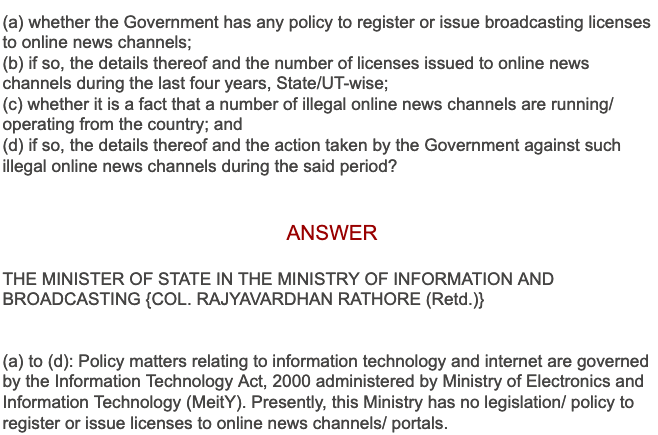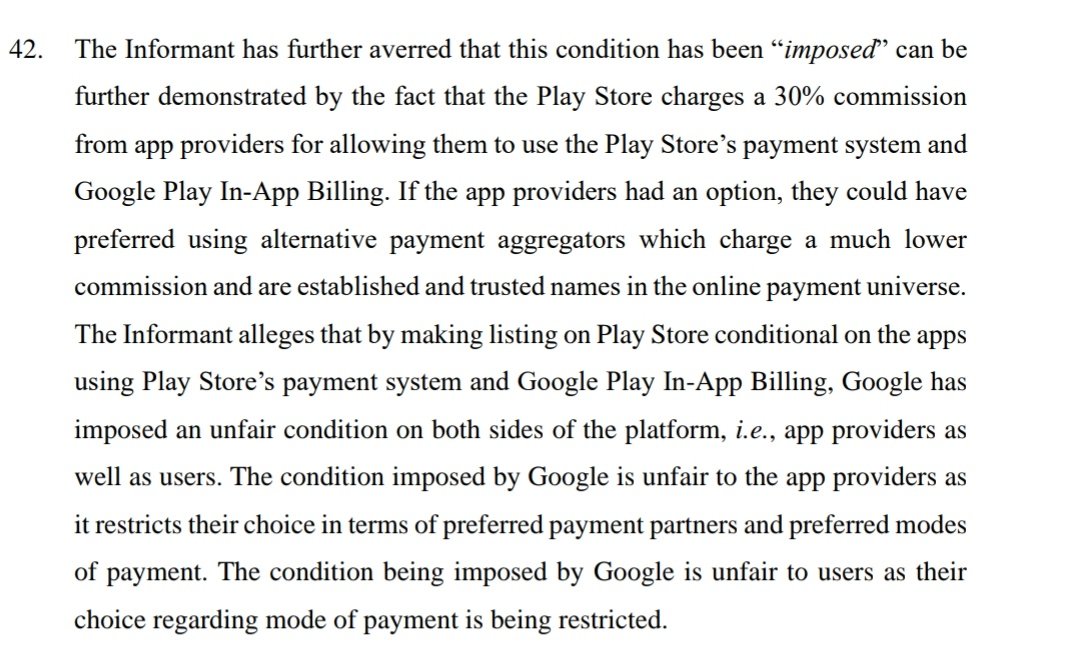
THREAD: The strange situation of India's Ministry of Information and Broadcasting (MIB) looking to regulate content on online streaming services like Netflix, Hotstar, Amazon Prime Video, Sony LIV etc. We've been tracking this since early 2018.
Some context from @nixxin:
1/
Some context from @nixxin:
1/
1. In an unexpected move (it has been rumoured for over a year), amendments in the allocation of business rules have given MIB jurisdiction over regulation of online streaming services. medianama.com/2020/11/223-ib…
2/
2/
2. Why is this strange? Firstly, bec streaming services are not like cable TV. It's not broadcast. When you choose a show/video, you pull content. It is private viewing. What separates a streaming service like Hotstar from Porn? The content, of course, but nothing structurally
3/
3/
Remember how the Modi government had given an undertaking in the Supreme Court about how they don't want to regulate private viewing.
"We don't want to do moral policing", Mukul Rohatgi, attorney general of India, had said in 2015 in the #pornban case medianama.com/2015/08/223-mo…
4/
"We don't want to do moral policing", Mukul Rohatgi, attorney general of India, had said in 2015 in the #pornban case medianama.com/2015/08/223-mo…
4/
How is MIB regulation of online streaming services not going to be moral policing?
Secondly, the IT Act doesn't envision a separate type of service called streaming service. All content creators are equal. you can stream my content in the same manner that Netflix can.
5/
Secondly, the IT Act doesn't envision a separate type of service called streaming service. All content creators are equal. you can stream my content in the same manner that Netflix can.
5/
A billion streaming services can exist online. How can the ministry define what is a streaming service, and differentiate from any individual streaming content?
3. Cases against streaming services have been piling up. Last month, in the Supreme Court:
6/
3. Cases against streaming services have been piling up. Last month, in the Supreme Court:
6/
Petitioners Apurv Arhatia & Shashank Shekhar Jha have asked for setting up of a "Central Board for Regulation and Monitoring of Online Video Contents (CBRMOVC).
medianama.com/2020/10/223-su…
Cases have been filed against Bad Boy Billionaires, Leila, Sacred Games, Mirzapur, others.
7/n
medianama.com/2020/10/223-su…
Cases have been filed against Bad Boy Billionaires, Leila, Sacred Games, Mirzapur, others.
7/n
4. BJP wants regulation of streaming services BJP spokesperson Hitesh Jain said at an event last October: “There is no doubt about the fact that [over the top] OTT has to be regulated"
medianama.com/2019/10/223-on…
8/
medianama.com/2019/10/223-on…
8/
Despite all the pressure, Govt is leaning towards self regulation.
Prakash Javadekar: “They [OTT platforms] do fall under the IT Act, but have no government or self regulation. This happens nowhere in the world,”
9/
medianama.com/2019/10/223-ne…
Prakash Javadekar: “They [OTT platforms] do fall under the IT Act, but have no government or self regulation. This happens nowhere in the world,”
9/
medianama.com/2019/10/223-ne…
I&B Secy Amit Khare last year said that certification of online streaming content “could be a guideline, it could be self-regulation, and it can also be an Act.
Largely leaning towards self regulation AFAIK, but MIB wants to define the code.
10/
Largely leaning towards self regulation AFAIK, but MIB wants to define the code.
10/
5. The "Self regulation code" for streaming services has been a controversial topic in the entertainment biz. It started in 2018, where, largely pushed by Netflix and Hotstar, IAMAI came up with a self regulation code.
My critique of the code:
medianama.com/2019/01/223-gi…
11/
My critique of the code:
medianama.com/2019/01/223-gi…
11/
This wasn't as bad as the next code which unexpectedly was released Feb 2020. It had only 5 signatories (as opposed to the 1st code with 9).
This created a self regulatory body with Justice AP Shah as head.
This would give govt censorship powers.
12/
medianama.com/2020/02/223-ia…
This created a self regulatory body with Justice AP Shah as head.
This would give govt censorship powers.
12/
medianama.com/2020/02/223-ia…
This was a controversial code. No industry consensus, Javadekar gave 100 days to finalise a code. Lots (LOTS) of pushback from within the industry re this code. This story pissed off those who were pushing for the 2nd code. IAMAI had been a bully: medianama.com/2020/03/223-dc…
13/
13/
Eventually, IAMAI's governing council met and told IAMAI to draft a new code, and not try and shove DCCC on the industry
14/
medianama.com/2020/03/223-ia…
14/
medianama.com/2020/03/223-ia…
New committee head Tarun Katial was instrumental in putting together a new code, which got max consensus medianama.com/2020/09/223-ne…
Summary of the 3rd code: medianama.com/2020/09/223-ia…
15/
Summary of the 3rd code: medianama.com/2020/09/223-ia…
15/
MIB wasn't happy with the code, it seems. From what we've heard, they wanted a list of prohibited content to be created. Meanwhile, they had to solve their jurisdiction issue. I'll explain.
16/
medianama.com/2020/07/223-ib…
16/
medianama.com/2020/07/223-ib…
Back in April 2018, a committee was set up by the MIB to regulate online content, including streaming services, and online news. i1.wp.com/www.medianama.…
This was unusual because online content (news or otherwise) is governed by Ministry of Electronics and IT (MEITY)
17/
This was unusual because online content (news or otherwise) is governed by Ministry of Electronics and IT (MEITY)
17/
MEITY, as far as I know, wanted nothing to do with content regulation. But under the allocation of business rules, it is MEITY jurisdiction and not MIB. In Parliament (2018), Col. Rathore had said that policies related to IT are MEITY's jurisdiction, and not that of MIB.
18/
18/

The Committee's work stopped after Smriti Irani was removed as I&B Minister, but the issue has remained.
TRAI has also tried to look into regulating streaming services, but eventually backed off. livemint.com/Politics/AS6gB…
19/
TRAI has also tried to look into regulating streaming services, but eventually backed off. livemint.com/Politics/AS6gB…
19/
7. So what happens next?
Here's my reading: MIB now has jurisdiction over streaming services (though it should be limited by the boundaries of the IT Act). It supports self regulation, but wants some control (power) and its kind of self regulation.
20/
Here's my reading: MIB now has jurisdiction over streaming services (though it should be limited by the boundaries of the IT Act). It supports self regulation, but wants some control (power) and its kind of self regulation.
20/
So now that it has jurisdiction, it will be in a position to get the kind of regulatory code. And streaming services, already resigned to self regulation, wont put up a fight even though the IT Act probably doesn't allow content regulation of streaming services.
21/
21/
Remember that this is private viewing, and the govt has no business, and a stated intent to not control what we watch privately. Streaming services want to avoid lawsuits,so will probably allow a code.
Who suffers? User choice. Because no one is standing up for user rights here.
Who suffers? User choice. Because no one is standing up for user rights here.
If you need to know more, check out our "Complete Guide to OTT Content Regulation in India"
medianama.com/2020/07/223-ot…
medianama.com/2020/07/223-ot…
A clarification from @tame_wildcard :
https://twitter.com/tame_wildcard/status/1326507853801140224?s=09
• • •
Missing some Tweet in this thread? You can try to
force a refresh




